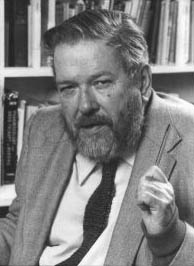Where George Grant Went Wrong
1,844 words
George Grant’s Lament for a Nation was most obviously wrong in its immediate predictions about Canada. He thought that Anglo-Canada would seek direct annexation by the dynamic American Republic. Many of his errors stem from a conflation of economics with cultural and political destiny.
Even now that Canada is almost entirely economically absorbed into the United States, annexation remains a fringe position. Most Canadians opposed the North American Free Trade Agreement (NAFTA) in the 1990s; the draw of consumption could not overcome national attachment, even one as meaningless as ours. The more rooted nationalism of French Canada has proved stronger. Grant predicted the ultimate failure of Québécois nationalism, a movement so successful that both leading parties in Quebec now embrace it. The new contest between the
Coalition Avenir Québec (CAQ) and Parti Québécois (PQ), both of which advocate sovereignty for Quebec, displaced the old competition between the nationalist PQ and the cosmopolitan liberals. There is no foreseeable future for non-nationalist politics in French North America.
George Grant likewise completely misunderstood American liberalism. He wrote Lament for a Nation at the apex of Kennedy-era liberalism, when America had put a man on the Moon. Grant had almost the same view that Anatoly Karlin now propagates half-a-century late, believing that American liberalism’s unstoppable progress would inevitably homogenize the world. Though he lamented its victory, he had no doubt that American liberalism would lead mankind to the stars and to mastery over nature and his own genes. Less than a decade later, Lyndon Johnson’s Great Society starved the space program.

You can buy Alain de Benoist’s Ernst Jünger between the Gods and the Titans here.
Now utterly exhausted, American liberalism worships worthlessness in the person of George Floyd and chants comically absurd slogans about black lives. How could Grant have misunderstood American liberalism so completely? He failed to grasp its inherent ideological contradictions and, given that he lacked a zoological and essentialist conception of man, he could not have anticipated that information technology would lead to partition rather than homogenization.
Though historical circumstance links the two, there is an inherent tension between liberalism and blank-slatism. For George Grant conservatism is the restraint of the passions for the common good. Conservatism means social order over freedom. Liberalism seeks to free the passions: “Social order is a man-made convenience, and its only purpose is to increase freedom.” Unlike earlier thinkers such as David Hume “that criticized the classical view of nature and natural law, but . . . still maintained some conception of what was natural,” later Enlightenment thinkers
advocated the progressive mastery through that freedom of human and non-human nature. Man in his freedom was thought to stand outside nature, and therefore to be able to perfect it. We could interfere with nature and make it what we wanted.
But if man is a blank slate shaped solely by external forces such as socialization rather than being possessed of an inborn, essential, and internal nature, what exactly is there to liberate?
Hume wrote that morality comes not from reason, but sentiment. This morality may be subjective, but it is not arbitrary; all moral sentiments lead to “utility.” The utilitarianism of Bentham and Mill is a butchered misunderstanding of Hume. Hume spilled much ink to argue that “utility” pleases; a meaningless exercise were “utility” the propensity of a thing to please. Hume lived a century before Darwin’s Origin of the Species and he leaves the question of how nature imbues man with the right moral sentiments open, but his conclusions are completely aligned with a Darwinian perspective. Happiness and pleasure are not ends, but nature’s means to lead men to the good — our survival and flourishing. Though politically moderate or even conservative for his time, his moral views on issues such as suicide are liberal even by today’s standards. Hume sought to free man from the “monkish virtues” of traditional religious morality so that we might follow our own, internal sentiments and better pursue the good.
The Humean conception falls apart if “man in his freedom” is “thought to stand outside nature.” The blank-slatist view deprives man of any innate direction. He is a block of marble for his parents, his community, and authority to sculpt. The Bolsheviks grasped the implications of blank-slatism far better than American liberals. To reconcile liberalism with the blank slate, one has to turn upon norms entirely:
In an earlier generation, liberals such as John Dewey claimed that this doctrine improved upon the past because it guaranteed a society in which all could do what they wanted, in which the standards of some would not be imposed upon others. Tastes are different, and we should have a society that caters to the plurality of tastes. How much fairer this would be than the old societies in which standards of virtue were imposed on the masses by pertinacious priests and arrogant philosophers.

You can buy Greg Johnson’s White Identity Politics here.
Without an innate nature to express, one is expected to find himself — or more accurately, to create an artificial individuality for himself — through consumptive choices. This leads to a perverse view of freedom as the ability to define ourselves.
Everything reflective of real, innate individuality and differentiation must be torn down. Since the 1960s this crusade has expanded from its original focus on race, and we now wage an absurd war to deconstruct sex as well. Race is not real. Gender is a social construct. Nations are economic zones, and anyone can transmute into a German or a Korean or a Dutchman or a Finn with a change of address. Gender can be changed at will, like clothes. One might even mix, match, and invent his own neopronouns.
The blank-slate’s perversion of freedom necessarily conflicts with liberalism. Anti-discrimination laws invade economic and private life. The right to live as the opposite sex is the right to be recognized as such by society; it is the right to others’ minds and opinions. So, too, is the right of anyone to any nationality that he chooses. Laws against hate speech and misgendering crush freedom of speech. Only an essentialist, Humean liberalism that asserts an innate drive toward the good, imbued by nature and viewing discrimination, racism, and misgendering as its expressions might defend freedom from choice.
The progress of American liberalism was an illusion. The space program that Grant frequently references was built upon German science and led by former SS men. American liberalism cannot allow men mastery over their own genes. There is an inherent conflict between its professed scientific monism and its mystical belief in the blank slate and the malleability of man. Only willful blindness can reconcile the two. American liberalism must waste incomprehensibly vast sums of money on uplift efforts for blacks, embrace ever more affirmative action, and adopt increasingly bizarre and irrational explanations for black dysfunction. Black uplift is proof of concept for American liberalism. Success would indisputably prove that it is a progressive ideology that can fulfill its promises. The single-minded obsession with racial uplift consumes American liberalism and, as American liberals age out of the population, far more radical Leftists take their place and bring even more extreme solutions and pseudoscientific claims.
Grant anticipated none of this, for his own views are blank-slatist. He wrote of Canada as an experiment in conservative governance. There is no sense that Canada is a nation defined by a specific, non-interchangeable people anywhere in Lament. For Grant the nation is national consciousness.
Grant’s nationalism shares little in common with the nationalism that I advocate. The usual terminology is civic nationalism against ethnic nationalism, but communitarian against individualist or innate nationalism might be more accurate terms. Grant’s nation is a shared experiment in the practical application of a certain political philosophy. As none are innately a part of it, it survives for only as long as its political and ideological traditions persist and command loyalty. It aligns with the conservative outlook that values traditions and restraint over freedom. In the individualist conception, the nation is an innate biological group united by shared blood, with religion, culture, and language relegated to secondary importance. Nationhood is the innate property of an individual rather than something imposed externally through socialization into a community. The nation can survive in a state of political dormancy without consciousness, as many nations throughout history, from Letts to the Arabs, have.
Communitarian nationalism is as old as the state. Rulers have relied upon myths and traditions to legitimize themselves for as long as they have commanded those outside of their immediate clan, to whom they have no inherent emotional connection. Though it has ancient precedents, individualist nationalism arises out of the rationalizing processes of modernity, as the state seeks a more solid basis for its identity and legitimacy than old myths and quaint traditions. Though the two are both labelled “nationalism,” they directly oppose each other. The nemesis of innate nationalism is the civic nationalist state. Innate nationalism is inherently liberal. The civic state restrains and redirects the natural impulse to in-group loyalty to serve its own ends. Innate nationalism seeks to free it from the state, to strip the state of a civic identity and reduce it to an outgrowth of a specific people.
As the Information Age advances, the civic state necessarily grows more authoritarian. On the Internet one can better express himself and pursue his own passions. But as men gather into like-minded groups, consensus breaks down. Epistemic partition sets in. The power of civic institutions to unite the population around common ideals fades. Censorship is the order of the day. Artificial intelligence advances so rapidly that films which once would have cost hundreds of millions of dollars might soon be generated in a few hours using text prompts. No common culture can persist among a diverse population under these conditions. The civic state must therefore stretch its tentacles into every aspect of life and snuff out every cry of dissent if it is to maintain any semblance of consensus.
Psychic character is mostly an expression of genes. Innate nationalism will be the only liberal alternative to the totalitarian civic state once the full effects of the Information Age set in. A population united by shared genes expressed in the same environment can organically avoid epistemic partition and maintain a common culture without the heavy-handed guidance of the state. The historical national state was the product of a biological revolution that followed the plague in Europe. A similar revolution might be needed to bring about the genostate, but through our own will. It may be necessary to reduce the genetic diversity of the populace below the level of any large state today through human cloning. The nuclear family will remain the norm; only a small portion of each generation need be clones to achieve the desired effect.
The greatest obstacle to the success of nationalists in this century is their own ideological confusion. The Traditionalist and communitarian ideas that infest nationalist journals are the sign of a confused and aimless movement that grasps desperately for whatever ideological weapons it can find. For nationalism to take its rightful place as the liberal alternative to the totalitarian civic state, it must first understand itself as such.



